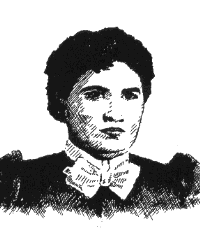| Home |
| Publications |
| Public Events |
| Press Releases |
| Reviews & Resources |
| Personnel |
| Contact |
| Orders |
| Search |
Language Lanterns wins CFUS translation prize
Language Lanterns donates books to Ukrainian universities. Details
Women's Voices in Ukrainian Literature

Yevheniya Yaroshynska
(1868-1904)
Biographical Sketch
Yevheniya Yaroshynska spent her short life in a constant struggle to educate herself and ameliorate the living conditions of the peasants among whom she lived and worked in her native province of Bukovyna in Western Ukraine. Born into the family of a village teacher, she was unable to receive a higher education, as her father believed that his first responsibility was to secure the future of his two sons. After completing her elementary schooling, she satisfied her intellectual curiosity by reading widely and intensively, and embarking on a systematic program of self-education.
At that time, the Ukrainian province of Bukovyna was part of the Austro-Hungarian empire, and German was imposed on the local Ukrainian population as the official language. The books that Yevheniya read, therefore, were all in German, and when she began writing she wrote in that language. Her first stories were published in a Viennese periodical when she was eighteen.
Just when Yevheniya was beginning her literary career in German literature, the first Ukrainian-language newspaper was established in Bukovyna under the editorship of Yuriy Fedkovych, one of the leading Bukovynian writers of the day. The articles published in this newspaper were pro-Ukrainian and promoted unification of Bukovyna with the rest of Ukraine. Drawn to the ideas expressed in the newspaper, Yevheniya began to correspond with its editor.
Under Fedkovych's influence, Yevheniya Yaroshynska began to read the works of Ukrainian authors from other parts of Ukraine, and to collect and study the folklore of her region. Becoming aware of the richness of her literary and cultural heritage, she decided to start writing in Ukrainian, and devote herself and her talent to her people.
Assiduously applying herself to the task of collecting folklore materials, Yaroshynska wrote down 450 Bukovynian folks songs. For this notable collection, she was awarded a silver medal and a sizeable monetary prize (500 karbovantsi) from the ethnographic section of the Russian Geographical Association. In 1888, she began writing articles for Ukrainian, German, and Czech periodicals about Bukovynian embroidery, Easter egg designs, and wedding rituals.
At this time, as the daughter of a village teacher, she seized the opportunity to assist in the local school, where she taught young girls many practical skills and traditional arts. This program proved so successful that other parents asked her to instruct their children as well.
By 1890, she was publishing stories written in Ukrainian, literary translations, and articles about contemporary issues in Bukovynian society. In addition, inspired by her young pupils, she began to publish stories in journals for children.
In 1891, she travelled to Prague with Nataliya Kobrynska and other cultural leaders from Western Ukraine (Bukovyna and Halychyna) to see an exposition of Czech artifacts. She was greatly impressed by the work done by senior citizens and the mentally challenged, and by the fact that these people were integrated into Czech society.
In 1892, Yevheniya began an apprenticeship as a teacher and, after writing a qualifying examination in 1896, received her teaching certificate. In conjunction with her teaching career, Yaroshynska contributed articles to pedagogical journals, began developing new curricula for village schools, and supported the idea of creating a teachers' association.
During this time, Yaroshynska became deeply involved in the women's movement in Ukraine. Encouraged by Nataliya Kobrynska and Olha Kobylianska, she wrote numerous articles and delivered speeches on the role of women in society. She participated in publishing the almanac Nasha dolya [Our Fate], edited by Kobrynska, which was devoted to fighting for equal rights for women in education, in the workplace, and as full-fledged members of society.
Yaroshynska also worked tirelessly on a practical level to improve the lot of peasant women. In 1889, after completing a weaving course, she began instructing peasant women in this craft, thereby hoping to provide them with an additional source of income. She also established reading clubs in which she read newspapers to peasants to inform them about contemporary political and cultural issues.
In 1904, Yaroshynska attended a teachers' convention in Chernivtsi with her father and presented a lengthy paper outlining an innovative curriculum for public schools. The response was enthusiastic, and she was asked to submit it to the district Board of Education. Unfortunately, her untimely death later that year prevented her from pursuing this goal and cut short her selfless efforts on behalf of the disadvantaged peasantry.
In her works, Yaroshynska expressed the view that the Ukrainian intelligentsia had an important role to play in educating the masses and improving their quality of life. She is remembered today as a prose writer, folklorist, pedagogue, and community activist.
All levels of society are reflected in Yaroshynska's works. Complementing the writings of other Bukovynian authors, they provide a realistic and sympathetic picture of life in that region of Ukraine at the turn of the twentieth century.
©1998 Language Lanterns Publications
ISBN 0-9683899-2-9 (v.3)
Sketch by Roma Franko; Edited by Sonia Morris
Volumes this author appears in:
